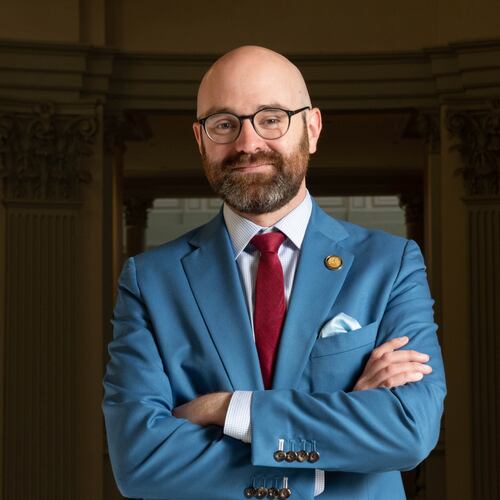On any other week before Mother’s Day, author and small business owner Emily Ley would probably be shuttling her three kids between carpools, leading a meeting for her company, or working on a creative project, like editing her latest cookbook.
Instead, she is on the phone talking about her decision last month to become the first person to file a lawsuit against President Donald Trump over the sweeping new tariffs he has imposed since April, tariffs she says her small business and others cannot survive.
“Suing the president was not on my Bingo card for this year,” she said. “But here we are.”
Ley started her business, Simplified, in part to create a flexible workplace for herself and other working moms. She now employs nine women through her Pensacola, Fla.-based company, which sells weekly planners, notebooks and accessories. Although 2025 was supposed to be a year of expansion and growth for Simplified, that changed dramatically in early March when Trump announced that he would impose new tariffs on all imported goods, including from China, where Ley’s products are manufactured.
Far from being the “cheap stuff” that Treasury Secretary Scott Bessent said should not be a part of the American dream, Ley’s planners are hard-cover volumes with thick card stock and gold-embossed lettering. Although Ley first had them made in America, high production costs and limited manufacturing options sent her looking for production overseas, which she said she found in China.
“Our first products in the United States cost me $38 a unit and they looked nothing like what our planner looks like today,” she said. “Our manufacturers in China are able to produce for us in a way that’s very high quality and great pricing. There is no option in America.”
It’s not new for Ley to pay tariffs to bring her products in from China; she said she’s paid $1.17 million in levies since 2017. But the new 145% tariffs that Trump announced last month would add up to $800,000 to $1 million this year alone — before she even pays for the products she plans to sell.
“We can’t absorb that, not at all,” she said. “We were already running on slim margins because we’re a small business.”
As Ley and her husband wrestled with how they could pay the new tariffs and still keep the company afloat, Ley said she also saw messages from Trump and others claiming that the Chinese government, not Americans, would be responsible for paying the new levies.
“I know who pays the tariffs, because it’s me,” she said.
Frustrated with the misinformation, Ley posted a message to her Instagram account explaining how the tariffs are impacting small businesses like hers. After the post went viral, Ley heard from the New Civil Liberties Alliance, a nonpartisan legal group in Washington, offering to represent her company in a lawsuit against the president to stop tariffs. Simplified v. Trump was filed in federal court in April.
“I went from talking about pot roast in my new cookbook to talking about international trade very quickly,” she laughed.
Andrew Morris, the senior legal counsel for NCLA, said that the Constitution gives Congress, not the president, the final authority to impose new taxes and tariffs. By creating sweeping new tariffs with the stroke of a pen, or in Trump’s case a Truth Social post, the president bypassed Congress entirely.
“There’s a reason for these Constitutional procedures. They give people a voice,” Morris said. “And here, the starting point is the Constitution says tariffs are completely the province of Congress.”
Morris also said that while well-connected executives from Apple or Amazon or Ford can get a meeting with the White House to ask for an exemption from the tariffs, small businesses like Simplified have only their members of Congress to go to, and those representatives had no say in the tariffs.
Several other small businesses have since joined the Simplified lawsuit. If it’s successful, Morris said it would void the tariffs for all American businesses, including those struggling under the same pressures in Georgia.
As recently as Wednesday, Trump said in the Oval Office he has no plans to reduce the tariffs on Chinese products any time soon. “We were losing a trillion dollars a year, now we’re not losing anything,” he said. “That’s the way I look at it.”
But American business owners like Ley are losing plenty.
“So many women started businesses after the economic crisis of 2008 because corporate life wasn’t structured for us or designed by women,” she said. “And I know so many female entrepreneurs, who are also mothers being impacted by this in terrible ways. It’s just so sad.”
Ley and her husband have been open with their kids about the challenges they could soon be going through. They’ve also told them that mom is suing the president, and that no matter what happens, this will all be an important lesson in resilience and working through hard things.
But after everything that’s happened in the last two months, Ley said there is one important thing she doesn’t think she can tell her children anymore.
“It doesn’t feel like I can tell them this American dream that my husband and I have lived out already from scratch will still be possible,” she said. “It doesn’t feel like that’s going to exist for them.”
On Mother’s Day, if you can, support a business being run by a mom like Ley. The White House may not think she’s being hurt, but it’s not so simple.
About the Author
Keep Reading
The Latest
Featured



